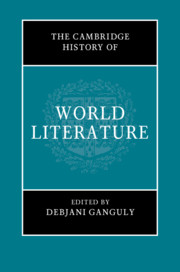Book contents
- The Cambridge History of World Literature
- The Cambridge History of World Literature
- Copyright page
- Contents
- Figures
- Contributors
- Acknowledgements
- Introduction
- Part I Genealogies
- Part II Thinking the World
- Part III Transregional Worlding
- Part IV Cartographic Shifts
- 22 The Multilingual Local: Worlding Literature in India
- 23 Oceanic Comparativism and World Literature
- 24 Mediterranean Worlds in the Long Nineteenth Century
- 25 Antipodal Turns: Antipodean Americas and the Hemispheric Shift
- 26 The Region as an In-between Space: Tomas Tranströmer’s Östersjöar and the Making of an Archipelagic Nordic Literature
- Part V World Literature and Translation
- Part VI Poetics, Genre, Intermediality
- Part VII Scales, Polysystems, Canons
- Part VIII Modes of Reading and Circulation
- Part IX The Worldly and the Planetary
- Index
- References
24 - Mediterranean Worlds in the Long Nineteenth Century
from Part IV - Cartographic Shifts
Published online by Cambridge University Press: 17 August 2021
- The Cambridge History of World Literature
- The Cambridge History of World Literature
- Copyright page
- Contents
- Figures
- Contributors
- Acknowledgements
- Introduction
- Part I Genealogies
- Part II Thinking the World
- Part III Transregional Worlding
- Part IV Cartographic Shifts
- 22 The Multilingual Local: Worlding Literature in India
- 23 Oceanic Comparativism and World Literature
- 24 Mediterranean Worlds in the Long Nineteenth Century
- 25 Antipodal Turns: Antipodean Americas and the Hemispheric Shift
- 26 The Region as an In-between Space: Tomas Tranströmer’s Östersjöar and the Making of an Archipelagic Nordic Literature
- Part V World Literature and Translation
- Part VI Poetics, Genre, Intermediality
- Part VII Scales, Polysystems, Canons
- Part VIII Modes of Reading and Circulation
- Part IX The Worldly and the Planetary
- Index
- References
Summary
This chapter argues that the Mediterranean continues to be a relevant framework of historical and literary analysis even after 1800. By shedding light on two microhistories, one involving the lives of two Ionian poets (Ugo Foscolo and Dionysios Solomos) who became the ‘national poets’ of two different countries (Italy and Greece), and the other a multilingual and multinational text, the Scintille (Sparks, 1841), written by the Veneto-Dalmatian intellectual Niccolò Tommaseo, the chapter offers a reading of nineteenth-century literary history that is regional and maritime rather than national and territorial. The aim is to show how we can re-inscribe intellectuals considered to be the ‘national fathers’ of their respective nations, and works—a part today of different canons of ‘national literature’—into their regional and multicultural context.
Keywords
- Type
- Chapter
- Information
- The Cambridge History of World Literature , pp. 458 - 476Publisher: Cambridge University PressPrint publication year: 2021

